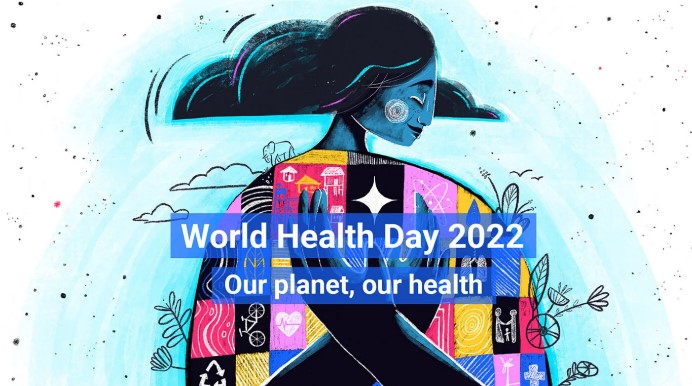There is an inherent link between public health and planetary health
7th April marks the anniversary of the founding of WHO in 1948

World Health Day 2022
Each year an annual celebration draws attention to a specific health topic that concerns people the world over.
Some 13 million deaths are annually attributable to avoidable environmental causes and the number of deaths will continue to grow unless overconsumption [Majdoub 2021] and reliance on fossil fuels are curbed. Environmental causes include the climate crisis [Persson et al. 2022] which is the single largest health threat facing humanity.
The climate crisis is a health crisis; it is also a social crisis.
At a time when the fight against the pandemic is still not over, when humanity is struggling to face the consequences of a hugely polluted planet and increasing diseases like cancer, asthma, heart diseases, neurodevelopmental disorders and impairments of the growth and development of the brain and other civilisation-related illnesses, WHO has now focused global attention on urgent actions required to keep humans and the planet healthy and trigger a movement to create societies that will work for the well-being of the people on World Health Day 2022 (https://www.who.int/campaigns/world-health-day/2022).
Our political, social and commercial decisions are driving the climate and health crises
Over 90 % of people on earth breathe unhealthy air resulting from fossil fuel burning. Global warming makes mosquitos spread diseases further and faster than ever before [Colón-Gonzalez et al. 2021]. Extreme weather events such as the heavy rainfall and floods of biblical proportions in the provinces of Namur and Liège (Belgium) displace people and affect their health. Ubiquitous chemical pollution and plastic micro and nanoparticles are found at the bottom of our deepest oceans, on the highest mountains, and have already made their way into the human body and blood [Leslie et al. 2022]. Systems that produce ultra-processed, unhealthy foods and beverages are driving a wave of obesity and diabetes, increasing cancer and heart disease while generating a third of global greenhouse gas emissions [Vaidyanathan 2021].
This World Health Day is a timely and necessary reminder that current global crises – we still face the COVID-19 pandemic, a global economic disquiet, and a terrifying war in Europe – are inseparable from climate change. We should not lose sight of the existential threat that ecological degradation poses to planetary and human health.
The contemporary design of the economy results in an unfair distribution of income, wealth and power, with too many people still living in poverty and a state of instability. A fair economy has human well-being, equity and ecological sustainability as its goals. These goals must be translated into intergenerational justice and long-term investments, well-being budgets, social protection and customised legal and fiscal strategies.
More than ever, the COVID-19 pandemic showed us the healing power of science. It also highlighted the inequities in our world. The pandemic has revealed weaknesses in all areas of society and underlined the urgency of creating sustainable well-being societies committed to achieving equitable health for our , and not to be forgotten, for future generations [Krznaric 2020; Pommier 2022].
Breaking the cycles of destruction for the planet and human health requires action
It has become obvious that the destabilising effects of climate change heavily affect the most vulnerable. Many low-income countries suffer most as a result of the rising sea-level, natural hazards, and food and water insecurity. Moreover, their lack of means to cope with these problems could lead to forced migrations.
Higher-income countries must act upon their commitments, as re-affirmed at COP26 in Glasgow, to fairly fund mitigation and adaptation activities, including investments in the resilience of health systems. However, in the wake of the COVID-19 pandemic and the war in Ukraine, some political leaders have called for intensification of fossil fuel extraction. Given the indisputable evidence for the destabilising influence of climate change on health and society, such suggestions should be dismissed as self-defeating.
Global crises should be a catalyst not for regression, but for rapid transitions to sustainable societies that focus on achieving good health and well-being for all the people and the planet. Let us not forget that in 50 years or even in 500 years’ time there will still be human beings living, working and loving across the continents of our planet. They will all be deeply influenced by how we act today.
This is definitely no time for pathological short-term thinking!
References
Colón-González et al. [2021]. Projecting the risk of mosquito-borne diseases in a warmer and more populated world: a multi-model, multi-scenario intercomparison modelling study, The Lancet Planetary Health 5, 7, e404 – e414
Krznaric [2020]. The Good Ancestor, WH Allen, pp. 323
Leslie et al. [2022]. Discovery and quantification of plastic particle pollution in human blood, Environment International, 107199
Majdoub [2021]. Consumeren als konijnen – De mythe van de overbevolking, Academic and Scientific Publishers, pp. 101
Persson et al. [2022]. Outside the Safe Operating Space of the Planetary Boundary for Novel Entities, Environmental Science & Technology 56, 3, 1510 – 1521
Pommier [2022]. La démocratie environnementale, Presses Universitaires de France, pp. 267
Vaidyanathan [2021]. Healthy diets for people and the planet, Nature 600, 22 – 25
